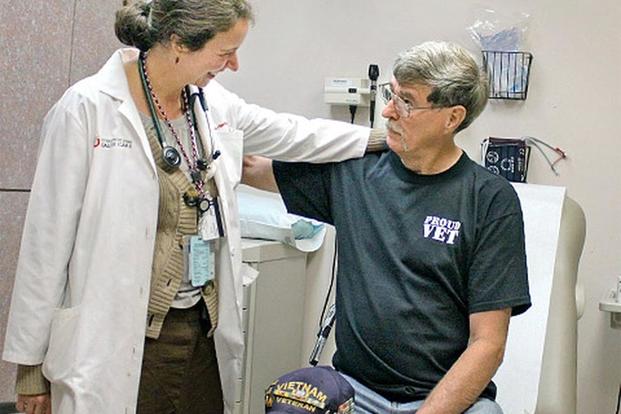The Department of Veterans Affairs today announced proposed rules for determining which veterans would be able to seek medical care in the private sector starting this summer -- their eligibility guidelines based on drive times and appointment waiting periods that could significantly expand the number of veterans seen outside the VA.
The VA Mission Act required the department to consolidate its private-sector care programs into a comprehensive community-care system that will provide veterans access to private health care networks under certain circumstances.
The criteria established by the law included access for veterans who live in a state without a VA medical center, who can’t access needed treatments at the VA, who have special medical needs, or who live more than 40 miles from a VA medical center.
The law also stipulated that veterans who meet certain standards for access to care developed by the VA could opt to use the network instead of going to a VA medical center or clinic.
Those access standards, announced Wednesday by VA Secretary Robert Wilkie, are based on driving times and appointment wait times.
Under the proposed standards, veterans would be able to see a community network provider if they drive an average of 30 minutes for primary care or mental health services at a VA health facility, or an average of 60 minutes for specialty care at the VA.
Also, veterans who wait 20 days or more for a primary care or mental health appointment, or 28 days or more for specialty care, with certain exceptions, could seek care in the private-care network currently being established.
Veterans would not be required to get their care through the network; they could always choose to be seen at a VA medical facility, according to the agency.
Wilkie called the proposed access standards a "vital part of the effort" to meet "veterans' needs and reinforce the trust that forms the basis for every interaction with VA."
"Most Americans can already choose the health care providers that they trust, and President [Donald] Trump promised that veterans would be able to do the same. With VA's new access standards, the future of the VA health care system will lie in the hands of veterans, exactly where it should be," he said in a statement released Monday.
The new standards -- and the considerable size of the contract the VA awarded to manage three of the VA's planned community care regional networks, worth up to $55 billion -- has raised concerns that the Trump administration is moving forward with privatizing the VA.
In December, Democrats on the House and Senate Veterans Affairs committees expressed concerns that liberal access standards would allow many veterans to utilize community care, undermining VA medical centers and clinics by drawing funding away from them in favor of private networks.
The lawmakers argued that allowing nearly all veterans who qualify for care to choose the private sector would essentially privatize VA medical care.
On Tuesday, 28 Senate Democrats, led by Montana Sen. Jon Tester, ranking member of the Senate Veterans Affairs Committee, sent a letter to Wilkie expressing their concern over how the VA developed the access standards and community-care program.
"The Department now intends to designate all clinical services as making a veteran nearly automatically eligible for community care. This will significantly increase the overall cost and amount of care VA will send to the community," they wrote. "Given that the administration opposes increasing overall federal spending, these increased costs for community care will likely come at the expense of VA's direct system of care. And that is something we cannot support."
In his statement, Wilkie acknowledged the possibility of a backlash but said the proposed changes give "veterans the power to choose the care they trust, and more veterans are choosing VA for their health care than ever before."
According to Wilkie, the number of VA medical appointments in 2018 was 58 million, up 3.4 million from 2014. He said wait times are shorter and veterans have expressed more trust in their care.
"VA is seeing more patients than ever before, more quickly than ever before, and veterans are more satisfied with their care than they have been previously," he said.
A spokesman for the Veterans of Foreign Wars said the organization is analyzing what the proposed access standards would mean for veterans. VFW Executive Director Bob Wallace expressed disappointment that the organization, which represents 1.6 million veterans, wasn't included in the process to develop the rules.
"VA is repeating previous mistakes," Wallace said in a news release. "Twenty days is just as arbitrary as 30 days and by simply once again adopting prime service area standards does not serve in the best interest of veterans."
The proposed guidelines also would grant veterans access to an urgent-care facility with the newly established community-care networks. According to the VA, veterans may be required to make a co-payment, but they would be allowed to seek urgent-care services.
The VA is encouraging people to comment on the proposed standards and urgent-care benefit on the Federal Register when they are published. The access standards are expected to go into effect when the final version is approved, probably in June.
-- Patricia Kime can be reached at Patricia.Kime@Military.com. Follow her on Twitter @patriciakime.













